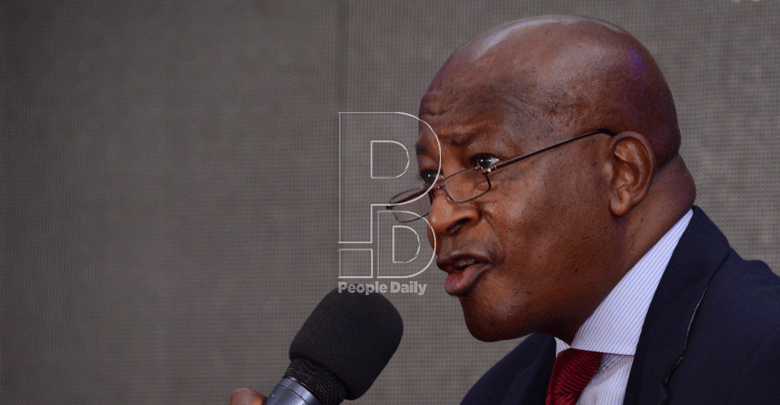Is it goofing or call to duty for Attorney General Kihara?

Emeka-Mayaka Gekara
Attorney General Paul Kihara Kariuki was an exemplary actor during his days in high school and at the University of Nairobi.
Indeed, he was a common feature at the Kenya National Theatre or Alliance Francaise playing roles in Shakespeare’s Othello and Chinua Achebe’s Concubine.
While being vetted for the job, the former President of the Court of Appeal told members of the Justice and Legal Affairs Committee he met his wife, Sarah, while playing the role of sheep on stage.
A son of one of the pioneer African Anglican bishops, Kihara could have also ended up as a man of the collar — and here, his oratorical skills would have come in handy.
This is, perhaps, the reason he was the choice programme director at Judiciary events when he was a judge.
Outside the courtrooms, Kenyans were treated to his oratory prowess on March 3, 2012, during the burial of former minister and Kiambaa MP Njenga Karume where he delivered a glowing elegy in impeccable English.
His beaming voice and piercing face were the subject of social media banter during the interviews for the posts of Chief Justice and Supreme Court judge. He was a pannelist.
Kihara has found himself in a tight corner over the controversial delay in the appointment of 41 judges nominated by the Judicial Service Commission (JSC) in May 2019.
Though he is a member of the JSC that approved the nominees, Kihara moved to the High Court to defend President Uhuru Kenyatta’s refusal to swear them in over claims some had integrity questions.
And when the High Court issued two orders directing that the President had no constitutional mandate to veto the JSC nominees, the AG appealed the rulings.
The appeal is blamed for the delay in the appointment of the judges, 11 of them earmarked for the Appeal Court which is in a dire human resource crisis.
It remains unclear why the AG made an about turn and contested individuals who he had played a role in nominating as a member of the JSC.
Matters are further complicated by the fact that Kihara is arguing a case against the same JSC in which he sits on.
In another ironic twist, the former actor now blames the Judiciary for the delay, accusing it of failure to decide his appeal to unblock the stalemate.
Playing victim
“This is a matter of great concern to this office and the honourable AG in person.
And we are very aware of the fact that this has caused consequences which are not desirable in the administration of justice,” he told the Senate committee on Justice and Legal Affairs.
“The matter is not within the control of office of Attorney General. It is in the judiciary,” Kihara told the committee.
The AG accused Court of Appeal judges of playing victims instead of settling the matter to bridge the shortage in subordinate courts.
In his appeal, the AG contends the High Court declaration that the President’s role in the process was only ceremonial.
The High Court, in a case filed by Adrian Njenga, had ruled that the President was constitutionally bound by the recommendations by the JSC.
In February 2020, a three judge-bench of the High Court ruled that the President had no mandate to review, reconsider or decline to appoint those recommended for promotion by the JSC.
But the AG faulted the ruling: “The learned judges failed to appreciate the bifurcation of the process of selection and appointment of judges and the vesting of the same into two distinct state entities.”
The AG said the High Court did not compel the President to appoint the judges but only made declarations.
“It is important to note that the court did not issue any injunctive orders against the President directing him to do or refrain from doing anything; save for orders of costs the court issued only declaratory orders,” AG said in submission to the senate.
The AG is not new to controversy. While serving as a judge, he played prominent role in the burial of Kibaki era Cabinet minister Karume, raising questions about his place in the Mt Kenya power coterie.
It is demonstrable that the judge had long been a favourite of the Mt Kenya power elite for a significant role in the justice system.
He was retired President Mwai Kibaki’s choice for Chief Justice to replace Evan Gicheru who had to retire six months after the enactment of the 2010 Constitution.
Opposition by then Prime Minister Raila Odinga, voices in the Judiciary and civil society, forced President Kibaki to withdraw his nomination in favour of judge Alnashir Visram.
Kihara was not successful in interviews for the post that would end up with Willy Mutunga. He was first appointed to the Bench in 2003 following the infamous purge in the Judiciary.
A deeply religious man, he was former Chancellor of the Anglican Church before being admitted to the Bar.
His critics say the AG is a man with “a propensity for style more than substance.”
“The AG is not a towering intellectual jurist like his predecessors,” said a senior lawyer.
“The AG’s judicial philosophy is a mystery. His jurisprudence has no intellectual rigour,” noted the lawyer.
During vetting, the Bible-quoting AG defended himself against accusations that he had been a gatekeeper for the Executive at the Judiciary.
Kihara is often criticised for his decision to assemble a bench to hear an appeal against a High Court order on the eve of the 2017 repeat election regarding the manner of appointment officers returning officers by the electoral and boundaries commission, which was deemed illegal.








